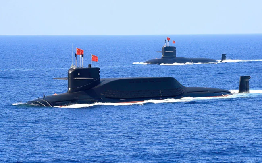Elon Musk’s Starlink has been covering the empty space above the Earth with its satellites with a plan to provide internet to the remotest corner of the planet. But a study in China has claimed that People Liberation Army’s (PLA’s) submarines equipped with laser would be able to destroy these satellites if the country’s security was at risk. According to South China Morning Post (SCMP), the study has been conducted by the scientists of PLA. It further said that such submarines will be produced in large numbers and deployed in various oceans to counter military threats to China.
The undersea vehicles will have the capability to remain submerged in water with a retractable “optoelectronic mast” coming out and firing at the target, the study further said.
The research by Wang Dan, a professor with the Naval Submarine Academy, was published last month in the Chinese-language journal, Command Control & Simulation, as per the SCMP report.
The entire project has been planned to hide the location of the attack vehicles (or submarines). Currently, missile launches are often accompanied by long trails of smoke, which can reveal the position of the attack vehicle. The team said this is too risky.
“Currently, the primary means of anti-satellite operations relies on ground-to-air missiles, but this approach has certain issues, mainly in terms of concealment,” SCMP quoted Ms Ms Wang and her colleagues as saying in the study.
“Taking the satellites launched by the Starlink programme as an example, they are numerous, densely packed and small in size, making the satellite network extremely resilient. Even if a significant number of satellites are destroyed, there are redundancies to replace them. Therefore, using missiles to attack such satellites is highly inefficient,” said the team.
“Submarine-based laser weapons can solve these issues,” the study document further mentioned.
It then detailed a step-by-step guide to attacking Starlink-like satellites.
“First, one or several submarines equipped with laser weapons are deployed to the sea area where the operation is to be conducted. They enter the target sea area according to the command instructions and wait for the satellites to come within their attack range. The time to raise the laser weapon is determined based on the previously acquired satellite overhead time,” said the study.
“When the satellite enters the attackable range, the laser weapon is raised. Due to the limitations of the submarine’s detection equipment, other forces are required to provide satellite position guidance for the submarine to attack the satellite. After the attack is completed, the submarine can submerge and wait for the next mission or return to the home port,” the researchers further said.
As of June 2024, there are 6,219 Starlink satellites in orbit, of which 6,146 are working, according to Astronomer Jonathan McDowell who tracks the constellation on his website.



